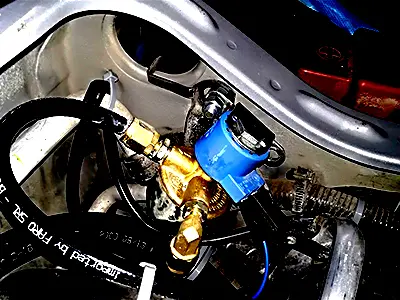
During the cold season, specific problems arise related to the operation of gas-cylinder equipment. However, by taking a few precautions, you can avoid unpleasant situations.
Before the onset of cold weather, it is recommended to carry out vehicle maintenance. If the mileage exceeds 10 thousand. km, then the gas filters should be replaced and, if necessary, the injectors should be calibrated or replaced. Do not forget that in winter you need to use a special gas mixture with a reduced butane content to ensure its evaporation and increased efficiency of the mixture. Butane evaporates at high positive temperatures, and propane at low temperatures. Therefore, in order to improve the quality of the gas used, its composition should be adjusted depending on the time of year.
It may also be necessary to insulate individual components of the gas equipment, for example, from the engine cooling system, or to use non-combustible materials. But the most important point during winter operation is the correct starting and warming up of the gasoline engine. In case of automatic system switching, this happens automatically. However, in case of manual control, it is necessary to pre-warm the engine to 50°C and switch to gas only after that. It is also recommended to keep the gas tank full to avoid an emergency switch to gas with an empty tank.
At very low temperatures below -30°C, a situation may arise when insufficient pressure appears in the LPG system. In this case, the car will switch to gasoline. It is important to understand that the engine can consume gasoline not only during startup, but also after warming up. Installing an LPG in the trunk can also increase the likelihood of switching to gasoline, especially when sitting outside at night. It is also necessary to monitor the coolant level to avoid gearbox failure due to its evaporation. But it is not recommended to use boiling water to warm the gearbox, as this may cause condensation. It should be drained every 1000 km, after warming up the engine well. It is also necessary to remember to fill the gas tank to no more than 80% in order to prevent possible problems when the gas expands when heated.
Owners of cars with gas equipment need to be aware that diagnostics and maintenance require greater care. Despite the fact that fuel savings are possible when using gas, the service life of a car using LPG, in some cases, may be lower than when using gasoline. It should also be noted that the engine may lose a small amount of power when running on gas. This is especially noticeable when driving up hills and when overtaking.
Winter operation of gas equipment can cause problems
- Firstly, at low temperatures, gas evaporation may slow down, which will lead to deterioration in engine performance. This is especially true when using liquid gas, as it is more prone to freezing at low temperatures.
- Secondly, at very low temperatures a problem may arise with the starter, which may not be able to start the engine on gas. Therefore, it is recommended to use gasoline to warm up the engine before switching to gas.
It should also be taken into account that some components of HBO may be more vulnerable to cold. For example, injectors or gearboxes may freeze and stop functioning properly. In this case, repair or replacement of these components may be required. In order to avoid these problems, it is recommended to regularly monitor the condition and performance of LPG components, as well as perform prescribed maintenance and regular diagnostics. It is also worth considering that the level of fuel consumption on LPG may increase in winter, especially at low temperatures. This is due to the need to use gasoline to warm up the engine. Therefore, owners of cars with gas equipment should take this factor into account when planning operating costs.

